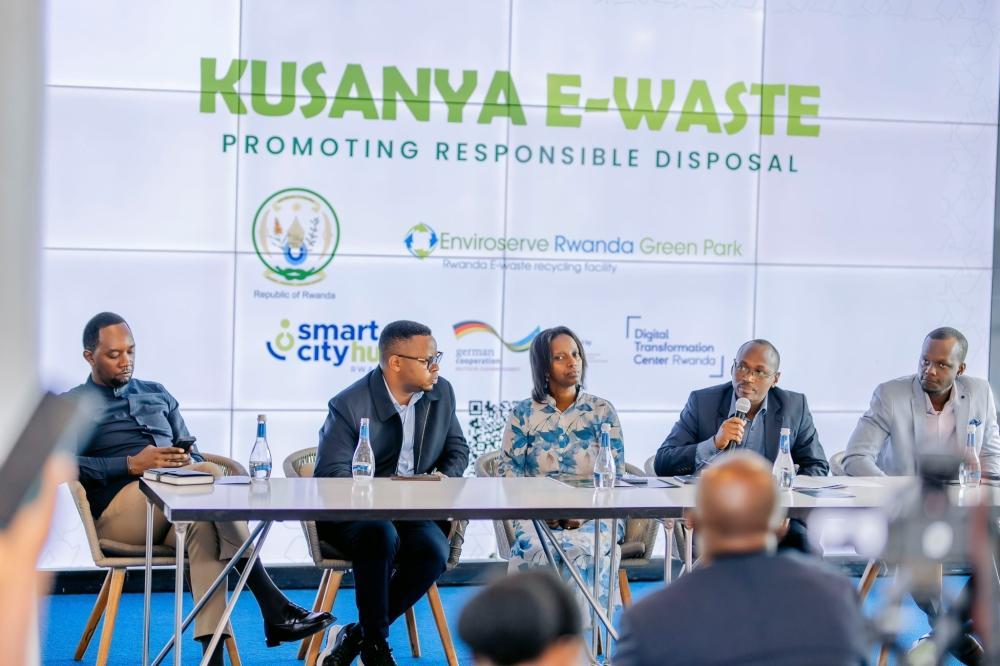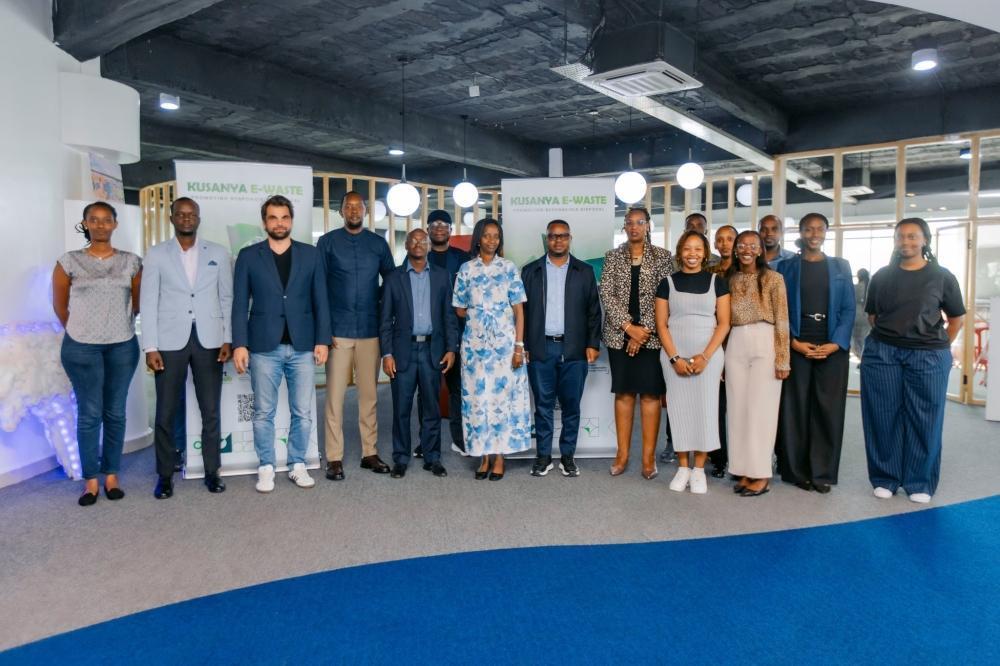Africa-Press – Rwanda. A new campaign dubbed “KUSANYA E-Waste” has been launched to promote safe and sustainable electronic waste collection and disposal across Rwanda.
The campaign, led by the Ministry of ICT and Innovation in collaboration with Enviroserve Rwanda, Rwanda Information Society Authority (RISA), the Ministry of Environment, and GIZ Rwanda through the Smart City Hub, aims to raise awareness of the dangers of improper e-waste handling and encourage responsible recycling.
The initiative empowers communities to distinguish between organic, recyclable, and electronic waste and to build eco-friendly habits that protect both human health and the environment.
“Technology has improved our lives, but it also generates e-waste such as smartphones, computers, batteries, and more that, if not properly handled, can harm our environment and health,” said Yves Iradukunda, Permanent Secretary at the Ministry of ICT and Innovation.
The campaign focuses on four pillars. They include educating the public about health and environmental risks of poor e-waste management, promoting safe recycling, especially using facilities like Enviroserve Rwanda, mobilising schools, businesses, and communities for collection efforts and encouraging behavioural change through digital media, roadshows, and demonstrations.
The campaign will initially cover Gasabo, Kicukiro, and Nyarugenge districts, featuring community events with live sorting demos, business roundtables promoting circular economy practices, media outreach, and educational materials in public spaces and repair shops.
E-waste is often mixed with regular trash, dumped in backyards, or burned—practices that release toxic substances into soil, water, and air, posing severe health risks.
The Ministry of ICT urges citizens, the private sector, and youth to support Rwanda’s push for sustainable electronic waste collection and disposal to ensure a circular economy.
Rwanda produces between 9,000 and 15,000 tonnes of e-waste each year, but around 80 per cent remains uncollected and untreated, according to Olivier Mbera, Country Manager at Enviroserve Rwanda, an e-waste recycling facility.
Delegates pose for a group photo at the launch
Since 2018, the facility has collected over 7,000 tonnes, preventing more than 4,000 tonnes of carbon emissions and creating over 1,000 green jobs.
“We have set up 34 e-waste collection points nationwide with RISA and the ICT ministry. E-waste includes recyclable materials but also toxic metals like lead and mercury. These toxins can contaminate soil and enter the food chain, with long-term health consequences,” Mbera said.
He urged the public not to discard e-waste or mix it with household trash.
Innocent Asiimwe Mudenge, the Digital Cluster Coordination and Community Development Division Manager at RISA, explained how increased mobile phone use contributes to e-waste.
Feature phones still dominate the market (85 per cent), but smartphone adoption is growing (34 per cent), he noted.
“The Connect Rwanda programme, which distributed 1.2 million phones, has led to many unused or discarded devices. E-waste isn’t limited to phones. It includes fans, fridges, TVs, washing machines, and other electronics,” he noted.
He said the campaign aims to broaden public understanding of what constitutes e-waste.
He added that trained environment and IT officers at district levels will act as local campaign champions.
Beatrice Cyiza, the Permanent Secretary at the Ministry of Environment, said, “e-waste should not be viewed only as an environmental burden, but also as a valuable resource.”
“It can be reused or recycled, contributing to Rwanda’s circular economy,” she said.
New strategy under development
To address long-term challenges, a National E-Waste Strategy (2025–2031) is in development, focusing on improving collection, transport, recycling, and innovation.
“RISA and the Ministry of ICT encourage innovation in E-waste collection, transport, refurbishment, recycling technologies. Startups, software engineers, and environmental innovators are invited to contribute solutions,” he added.
Robert Mugisha, the Director of Registration and Licensing Unit at Rwanda Inspectorate Competition and Consumer Protection Authority (RICA), emphasised the critical role of regulation and shared responsibility in tackling Rwanda’s growing e-waste challenge.
He pointed out that although Rwanda has over 250 traders dealing in used electrical and electronic products, there is no comprehensive record of how many devices enter the market.
He stressed the need for regulatory oversight through an Extended Producer Responsibility (EPR) framework.
Extended Producer Responsibility (EPR) principle requires manufacturers and importers to take responsibility for the end-of-life management of their products.
Since 2022, stakeholders have been developing a national EPR system to ensure that manufacturers and importers take responsibility for the end-of-life management of their products.
The proposed system includes a centralised electronic platform for registering producers, tracking products from import to disposal, collecting EPR fees to fund recycling and requiring reports on collection and recycling performance.
Mugisha emphasised that public participation is essential.
“The success of these efforts depends on people returning old electronics to collection points and understanding their role in this shared responsibility.
The KUSANYA E-waste campaign is a major step in addressing Rwanda’s growing e-waste challenge by combining public education, policy development, and strategic partnerships for a greener, safer future,” he said.
The campaign will initially cover Gasabo, Kicukiro, and Nyarugenge districts
Yves Iradukunda, Permanent Secretary at the Ministry of ICT and Innovation, delivers his remarks at the launch
For More News And Analysis About Rwanda Follow Africa-Press









